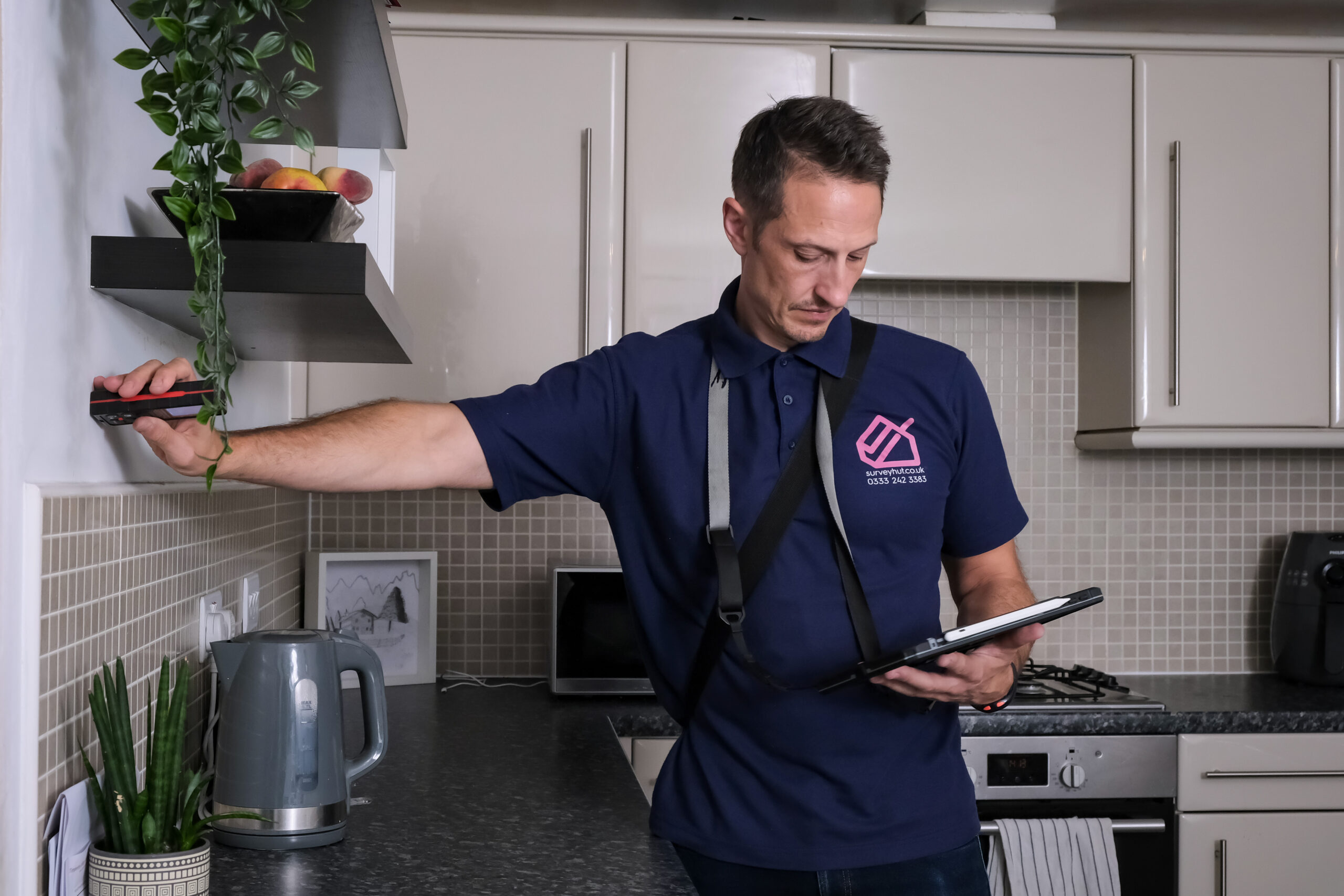The simple answer is that a HomeBuyers Survey does not include more than a visual inspection of the electrical, gas and heating installations. However, at Survey Hut, we offer a Level 3 MAX Home Survey that tests and checks these installations with the help of a qualified engineer, and we include our findings in a report.
When you’re in the process of buying a home, understanding the extent of the HomeBuyers Survey is crucial for your peace of mind. You might wonder whether this survey includes checks on the property’s boiler and electrics. It’s important to know that a HomeBuyers Survey aims to provide you with a thorough overview of the property’s condition and highlight any serious issues that may impact the value or safety of the home.
The survey focuses on the visible aspects of the property, including its structure and condition. It is less detailed than a full building survey but more comprehensive than a basic valuation.
Having awareness of what is and isn’t included in your HomeBuyer’s Survey ensures you are prepared for any additional inspections that might be required. If a surveyor observes any potential concerns with your boiler or electrical systems, they will likely recommend further expert evaluations to ensure these critical components are in good working order and meet safety standards.
Understanding Home Survey Types
When you’re buying a home, it’s crucial to understand the types of surveys available to assess the property’s condition. These surveys can spotlight potential issues and ensure you make an informed purchase decision.
What Is a HomeBuyers Survey?
A HomeBuyers Survey, also known as a Level 2 Home Survey, is a medium-detail inspection of a property’s condition. Designed to be clear and easy to understand, it lists any major problems that could affect the value of the home. It’s less thorough than a building survey but gives you a good overview of the place you’re hoping to call yours.
- Survey Checkpoints:
- Structural checks.
- Major faults and urgent repairs needed.
- Any damp or timber issues.
Differences Between HomeBuyers Surveys and Building Surveys
A Building Survey (Level 3 Home Survey) is more comprehensive than a HomeBuyers Survey. It’s highly detailed and examines all accessible parts of the property. If you’re buying an older or unconventional home, a building survey is advisable due to its breadth.
- Building Survey Highlights:
- Extensive analysis of the property’s condition.
- Insights into potential maintenance work.
- HomeBuyers Survey Highlights:
- Summarised review of the property.
- Identifies issues needing immediate attention.
Your HomeBuyers Survey and Building Survey will typically cover areas such as the roof, walls, floors, windows, and doors. However, it doesn’t include an in-depth assessment of the heating and electrical systems.
Key Aspects Examined in HomeBuyers Surveys
When you commission a HomeBuyers Survey for a property you’re interested in, certain critical aspects of the dwelling will be scrutinised. It’s designed to uncover urgent issues that could impact your decision to purchase or the value of the home.
Structure: Surveyors examine the integrity of the building’s structure. This includes walls, ceilings, floors, and the roof space. You’ll be alerted to signs of deadly defects.
Roofing: The condition of roofing components, like tiles, flashing, and guttering, is checked. The aim is to identify any wear or potential leakage areas.
External Elements:
- Windows and doors: They are inspected for signs of disrepair or rot.
- Boundaries: Walls and fences demarcating the property are checked for stability and condition.
Area | Checklist Highlights |
Internal Structure | Damp, cracks, woodworm, and general wear and tear |
External | Windows, doors, boundaries |
Your survey may also include an appraisal of insulation, but it’s worth noting that HomeBuyers Surveys and Building Surveys don’t involve invasive checks.
Boiler and Electrical Surveys: Special Considerations
Age and Condition
Your boiler’s age can significantly influence its efficiency and the likelihood of needing repairs. Watch out for the installation date and any servicing records. Expect details on:
- Wear and tear: Signs include rust, leaks, or noise.
- Performance history: Past breakdowns or ongoing issues.
For electrical surveys, the most important considerations include:
- Circuit age: The age of the consumer unit, electrical system and when it was last rewired.
- Condition: Any visible signs of damage, outdated components, or DIY fixes.
Safety and Regulation Compliance
The strict adherence to safety guidelines is vital. A basic checklist will include:
- Boiler compliance: Inspection for adherence to the current Gas Safety Regulations.
- Boiler components: Check for safe operation of essential parts like the flue and safety release valve.
The electric system is also scrutinised for:
- Regulatory compliance: Including adherence to the latest edition of the UK Wiring Regulations.
- Safety devices: Such as the presence and functioning of circuit breakers and RCDs (residual current devices).
Where Level 3 MAX Surveys Come In
When purchasing a home, a thorough inspection of the property is paramount to uncover any hidden issues. Level 3 MAX surveys provide a more extensive examination compared to standard HomeBuyers or Building Surveys – they include checks and tests on the electricity, gas, and heating installations by qualified experts.
Optional Checks and Specialist Investigations
The extra checks and testing on the electric, gas and heating installations are not typically covered under a standard HomeBuyers or Building Survey, but can be crucial for ensuring the safety and functionality of your potential new home.
- Boiler Inspection: Checking the age and how much life is left in the boiler. You don’t want to move into a house with no heating.
- Electrical and Gas Installations Assessment: A comprehensive check of the electrical and gas systems by a qualified engineer can reveal any potential hazards or necessary upgrades to meet current safety standards.
These additional inspections provide peace of mind by highlighting areas that may require immediate attention or could lead to significant expenses in the future. They are particularly recommended for older properties or those with unique features. It’s important to remember that while these checks incur extra charges, they could prove invaluable by preventing costly repairs down the line.
Get in touch with Survey Hut today for a comprehensive Home Survey. We are held to the highest professional standards by the RICS, so you know that you’ll get a high-quality report. Make sure your perfect home, is perfect.
Sharing is caring!



